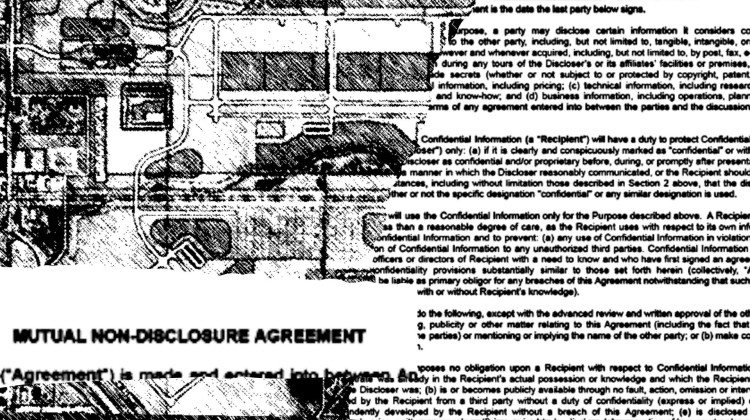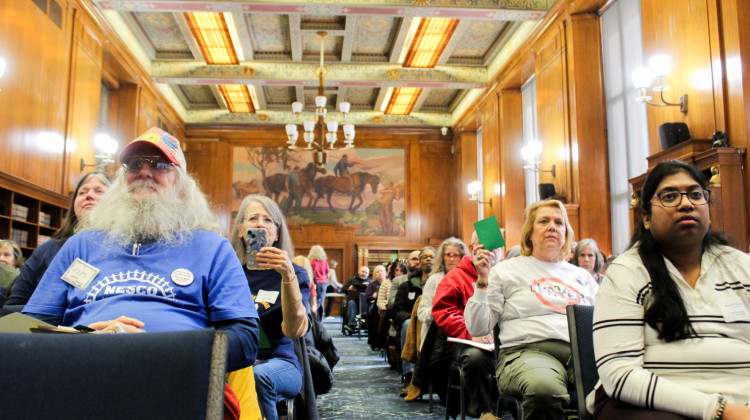
At least one government official signed a non-disclosure agreement related to the proposed data center in Franklin Township, raising questions about how much information will be publicly available if it comes to a vote.
Farrah Anderson / WFYIThis story was updated on Thursday, June 26, 2025 at 5:41 p.m. ET.
Michael-Paul Hart, an Indianapolis City-County Council member representing the southeast side of Indianapolis, said he doesn’t usually sign non-disclosure agreements as part of his job.
But this past year, he did — agreeing to keep confidential details about a proposed large-scale data center in Franklin Township, including the name of the tech company behind it.
Data centers are buildings that store and process huge amounts of digital information, needed now more than ever with the rise of artificial intelligence and demands for more data storage. Research suggests they can have negative impacts on water, power, the environment and even residents’ health and quality of life.
In Franklin Township, a Fortune 100 tech company — whose identity has not been publicly disclosed — is seeking to rezone nearly 468 acres to build a massive data center campus, roughly the size of 350 football fields. The proposal, filed under Deep Meadow Ventures, LLC, would transform farmland and residential-adjacent parcels near South Post Road, East Troy Avenue, Davis Road and Vandergriff Road into a commercial site with data centers, utility structures and supporting infrastructure.
As residents raise concerns about environmental impacts, noise and lack of transparency, they’ve also questioned why at least one City-County Councilor signed a non-disclosure agreement with the developer.
Hart, who was elected in 2019 to represent the district and works for a separate tech company, said he signed the NDA for one reason: to be included in the conversation. But it’s unclear how much information he can share with the public.
“I talked to some folks, and then I had like two opinions, right? One's telling me, ‘Don't do it. It's public, you know, that should be open, and all these things,’” Hart said.
“And the other is saying, ‘Well, you're not going to be in the conversation if you don't sign it.’”
That tension has only grown as the proposal moves closer to a final decision.
First, a city Hearing Examiner is expected to conduct a public hearing on June 26 and send their recommendation to the Metropolitan Development Commission, which will hold a vote and make a decision. (Update: The Hearing Examiner recommended approval for the proposal during the June 26 public hearing)
At a later date, Councilor Hart — as the representative of the district where the data center is being proposed — may decide to hold a public hearing on the proposal before the entire City-County Council, which will vote on it. To approve or reject the final proposal, at least 15 of the 25 council members need to vote. If they don’t reach that number — or if Hart doesn’t call for that public hearing — the Metropolitan Development Commission’s decision stands, according to the municipal code.
Since he signed the NDA, Hart said he’s played the role of a middleman — passing information between the company and the residents he represents. Before speaking at public meetings, he said, he checks what he’s legally allowed to share under the NDA’s terms.
WFYI reached out to Joe Calderon, the attorney representing the entity behind the data center, but he declined to comment, saying, “I am not authorized to make any comments.”
Companies commonly use non-disclosure agreements in economic development projects like data center deals, arguing they prevent trade secrets from leaking and shield them from data breaches and competitors. But critics say NDAs serve a different purpose: limiting what public officials can disclose and stifling community input.
According to a copy of the non-disclosure agreement Councilor Hart signed on Dec. 6, 2024 and shared with WFYI, the agreement “will remain in effect until it is terminated by either party with thirty (30) days prior written notice,” suggesting that the NDA will likely remain in place through the voting period. The agreement adds: “Unless the parties otherwise agree in writing, a Recipient’s duty to protect Confidential Information expires five (5) years from the date of disclosure.”
For residents like Andrew Filler, a hobby farmer who moved to Franklin Township in 2017, the secrecy is alarming. He launched a campaign called “Protect Franklin Township” to oppose the data center and the silence surrounding it.
The company behind the data center answered a list of around 100 questions from the public on issues related to the data center, including their impact on water, power, noise pollution and the company itself. But residents say much is still unknown to them.
“We are a large community, really in the dark, and it's really concerning,” Filler said.
‘Democracy dies in the dark’
It's unclear how many people within the City-County Council or state agencies have signed non-disclosure agreements with the developers of the data center.
WFYI requested all non-disclosure agreements related to the proposed data center in Franklin Township, but the city did not provide the records before publication.
Councilor Hart told WFYI that several state agencies also signed non-disclosure agreements.
Ashley Gibbons, a vice president at the Indiana Economic Development Corporation, wrote in an email on June 18 that it “cannot confirm or comment on potential projects.” This comes as Gov. Mike Braun dismantled the IEDC board and appointed new members on Monday.
Councilor Hart also said that AES Indiana, a utility company that largely serves Indianapolis, signed a non-disclosure agreement around the data center, but in a statement, AES’ Director of Communication Mallory Duncan would not confirm if they have, and said they “cannot give any further information about possible projects in our service territory at this time.”
The use of NDAs is legal and common in some types of economic development projects — not just data centers — but critics say that does not mean they should remain this way.
The issue has recently attracted the attention of some Indiana lawmakers.
In 2023, lawmakers introduced a House bill that aimed to prohibit the Indiana Economic Development Corporation, the state, or any other public authority from entering into any confidentiality agreements or contracts that include provisions prohibiting them from disclosing, discussing, describing, or commenting upon the terms of the agreement or contract.
The bill, authored by Rep. Robb Greene and Rep. Zach Payne, died after it was referred to the Committee on Government and Regulatory Reform.
Critics of NDA use in data center deals say that the agreements can prevent the public from accessing critical information needed for meaningful debate.
“Democracy – some say – dies in the dark. But that is exactly where many data center deals are born and live,” Eric Bonds, a sociology professor at the University of Mary Washington, wrote in an online commentary.
In an interview with WFYI, Bonds, who teaches on the topics of human rights, climate change and environmental justice, said even shielding the name of the company from the public can be problematic for communities.
“You would want to know the name of that company, so you could learn about how it's operated elsewhere, and you could decide, is it going to be a good neighbor or not?” Bonds said.
“This raises questions about when big companies come in like this that might just change the local dynamics of who's really calling the shots.”
Residents worry about the impact on quality of life
The U.S. has more than 5,400 data centers, the most in the world by far, powering the AI boom. The Midwest has also been an attractive spot for many of the big tech companies thanks to its central location, robust infrastructure and lucrative tax breaks offered by state governments. In Indiana, for example, lawmakers passed legislation in 2019 waiving sales tax on equipment and energy for up to 25 years — or up to 50 years for projects worth more than $750 million.
Proponents of data center development say they foster innovation and economic development in the state, and create jobs.
But the data center boom is driving up demand for electricity and water across the country, as well as impacting the quality of life of nearby residents. And some research suggests that potential economic gains may be offset by other costs.
A 2025 paper out of Harvard University found that secret deals between utilities and tech companies can shift energy costs onto nearby residents. Franklin Township residents are concerned about the potential cost of upgrading infrastructure — expenses that could fall on taxpayers.
Data centers also use millions of gallons of water daily to cool down their devices. In Franklin Township, where many rely on well water, residents worry the development could drain their water.
A December 2024 paper out of CalTech and the University of California Riverside, and published in the non-peer-reviewed open-access journal arXiv, looked at air pollution produced by data centers and the associated public health spending. It estimated that the cost of treating illnesses — like cancers, asthma and other diseases — tied to air pollution by data centers added up to a whopping $5.4 billion since 2019. According to the study, low-income communities were particularly impacted.
The researchers added that the air pollution is expected to result in as many as 1,300 premature deaths by 2030 in the U.S., and that it would cost the country around $20 billion per year due to public health costs and missed work and school days.
There’s also increasing concern about noise pollution generated by these data centers that operate around the clock near residential areas.
It’s for these reasons that experts like Pat Garofalo, the director of state and local policy at the American Economic Liberties Project, a nonpartisan nonprofit that researches monopolies and advocates for the deconcentration of power in economic markets, said that elected officials signing the non-disclosure agreements prevent them from representing the public.
“It's a complete dereliction of duty on the part of a public official to say, ‘Yes, I will keep my constituents in the dark to benefit one specific corporation.’”
Michael-Paul Hart, the city councilor in Indianapolis, said he doesn’t regret signing the agreement, because it got him in the room. Without signing it, Hart said he would be in the dark himself.
“I think it was a good idea for me to sign it, or else I couldn’t have had these conversations to try and make the best informed decision for the people,” he said.
Farrah Anderson is an investigative health reporter with WFYI and Side Effects Public Media. You can follow her on X at @farrahsoa or by email at fanderson@wfyi.org.
 DONATE
DONATE








 Support WFYI. We can't do it without you.
Support WFYI. We can't do it without you.